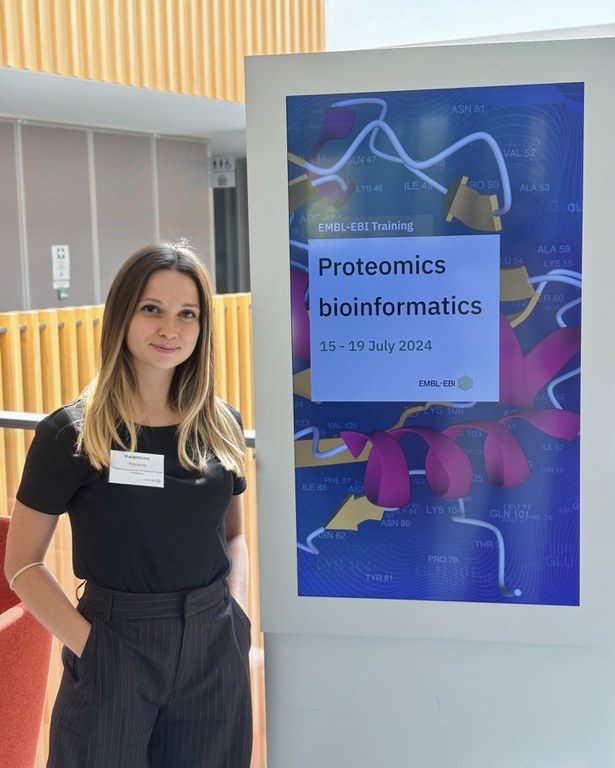Valentina Marano Awarded Travel Grant to Attend Prestigious Proteomics Course

Valentina Marano, an emerging researcher in the Cortese's Laboratory at TIGEM, successfully completed a highly specialized course on mass spectrometry (MS) and proteomics bioinformatics. This course, organized in collaboration with the Vlaams Instituut voor Biotechnologie (VIB), was held at the European Molecular Biology Laboratory-European Bioinformatics Institute (EMBL-EBI) in Hinxton.
The course provided comprehensive hands-on training covering the basics and advanced techniques of MS and proteomics. Participants learned to navigate various search engines and post-processing software, engage in quantitative approaches, and utilize MS data repositories. The training was structured to guide attendees from interpreting raw data from proteomics experiments to identifying and quantifying peptides, and finally, to analyzing protein identifiers using a myriad of bioinformatics tools.
Valentina's role in the laboratory of Mirko Cortese at the Telethon Institute of Genetics and Medicine (TIGEM) focuses on understanding how positive-sense single-strand RNA viruses, like SARS-CoV-2, interact with and remodel cellular structures to facilitate viral replication. Her research has significantly contributed to the understanding of virus-induced changes in cellular organelles and potential pathways for targeted antiviral therapies. Her work is particularly notable for integrating molecular virology, cell biology, and advanced imaging techniques.
The knowledge gained from the course is particularly relevant for Valentina, enhancing her capabilities to process and analyze biological data, further augmenting her research into viral replication mechanisms.
The course catered to research scientists, industrial, laboratory, and clinical staff, as well as specialists in related fields, requiring participants to have a basic understanding of mass spectrometry experiments for proteomics. It covered various topics, including quantitative proteomics, data independent acquisition approaches, and the use of proteomics repositories such as PRIDE and ProteomeXchange.
Held in the well-equipped training suite at EMBL-EBI, the course offered an engaging environment where attendees deeply immersed themselves in the practical aspects of proteomics. The organizers also took precautions related to the ongoing pandemic, ensuring the health and safety of all participants.
Completing this prestigious training event marks a significant step forward in Valentina’s professional development and positions her to contribute even more effectively to the global understanding of viral diseases, particularly during times when such research is crucial.
